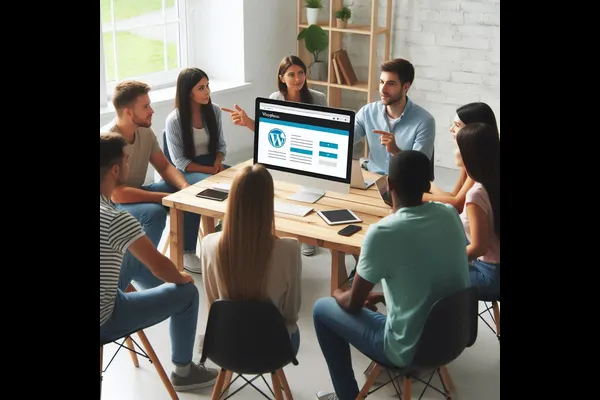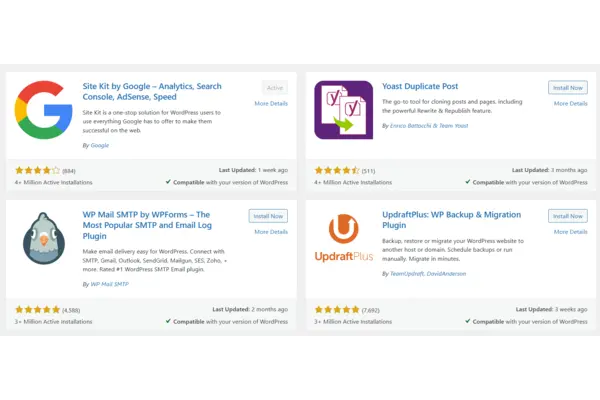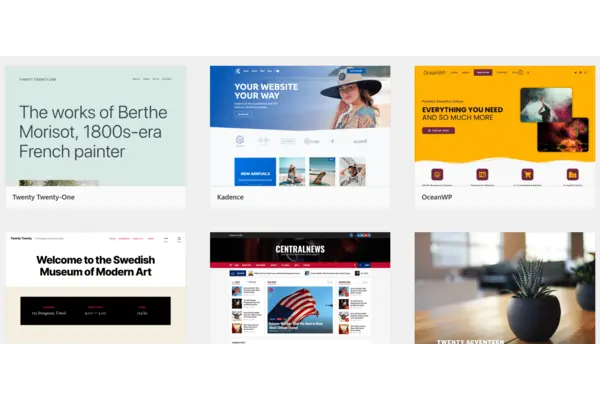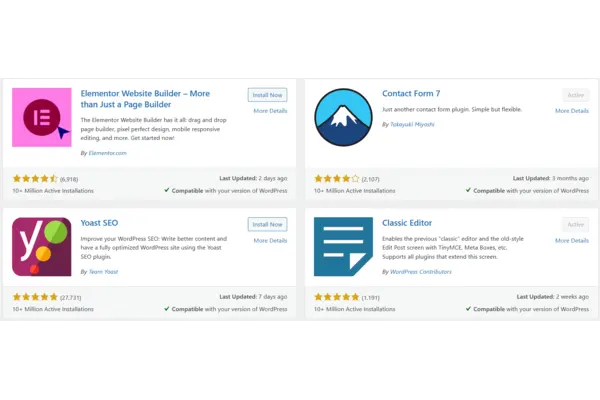WordPress for Beginners: Your Gateway to Website Creation
Ever dreamed of having your own website? Imagine a place where you can showcase your talents, share your passions, or even start a business. Well, with WordPress, that dream is closer than you think.
Think of WordPress like a digital toolbox. It’s a powerful tool that helps you create beautiful, professional websites without needing to know a single line of code. It’s like building a house with pre-made walls and a roof, but you get to choose the colors, furniture, and decorations.
This course is your guide to mastering this tool. This will teach you everything from the basics of setting up your website to customizing it to your liking. You’ll learn how to add stunning photos, write engaging content, and even create an online store if you want.
By the end of this course, you’ll have the confidence and skills to build a website that you’re proud of. So, are you ready to take the leap and start building your online presence? Let’s get started!
Why Choose WordPress?
Accessibility: WordPress is renowned for its user-friendly interface, making it an excellent choice for individuals who may not have a strong technical background. This accessibility is due to several key factors:
Intuitive Dashboard:
- Visual interface: WordPress features a clear and visually appealing dashboard that’s easy to navigate.
- Drag-and-drop functionality: Many tasks, such as adding content or customizing the layout, can be accomplished with simple drag-and-drop actions.
- Clear labeling: The dashboard uses intuitive labels and icons to guide users through the various features and options.
WYSIWYG Editor:
- What You See Is What You Get: This editor allows you to see how your content will appear on the website as you’re creating it.
- Formatting options: You can easily format text, add images, and insert links using a variety of tools and buttons.
- Real-time preview: Changes made in the editor are reflected immediately, providing instant feedback.
Extensive Documentation and Support:
- Online resources: This tool offers a vast amount of documentation, tutorials, and forums available online.
- Community support: There’s a large and active WordPress community where you can find help and advice from other users.
- Plugins and themes: Many plugins and themes come with their own documentation and support resources.
Beginner-Friendly Themes and Plugins:
- Pre-designed templates: WordPress offers a wide range of themes that can be installed with a few clicks, providing a ready-made foundation for your website.
- Easy-to-use plugins: There are countless plugins available that add specific features to your website, such as contact forms, e-commerce capabilities, and social media integration. Many of these plugins are designed with beginners in mind.
Overall, WordPress’s accessibility makes it an ideal choice for anyone who wants to create a website without needing extensive technical expertise. Its user-friendly interface, combined with its extensive resources and community support, ensures that even beginners can successfully build and manage their online presence.
Flexibility: WordPress is renowned for its versatility, allowing it to be used to create a wide range of websites, from personal blogs to large-scale e-commerce platforms. This flexibility is due to several key factors:
Themes:
- Vast selection: This tool offers a vast library of themes, catering to various website types and styles.
- Customization: Many themes are highly customizable, allowing you to tailor the appearance and layout of your website to your specific needs.
- Responsive design: Most modern themes are designed to be responsive, ensuring that your website looks great on different devices, such as desktops, tablets, and smartphones.
Plugins:
- Extensive library: There are thousands of plugins available that can add specific features and functionalities to your WordPress website.
- Customization options: Many plugins offer various customization options, allowing you to fine-tune their behavior and appearance.
- Integration with other services: Plugins can be used to integrate your website with other services, such as social media platforms, email marketing tools, and payment gateways.
Content Management System (CMS):
- User-friendly interface: WordPress’s CMS makes it easy to create, edit, and manage content on your website.
- Flexibility: You can create different types of content, such as blog posts, pages, and custom post types, to suit your specific needs.
- Organization: WordPress provides tools for organizing and categorizing your content, making it easy for visitors to find what they’re looking for.
Scalability:
- Growth: WordPress can easily scale to accommodate your website’s growth. As your website becomes more popular, you can add more resources and features to handle the increased traffic and complexity.
- Performance optimization: There are many plugins and techniques available to optimize your WordPress website’s performance, ensuring that it loads quickly and efficiently.
In summary, WordPress’s flexibility makes it a suitable choice for a wide range of website projects. Whether you’re starting a personal blog, launching an online store, or creating a corporate website, WordPress can provide the tools and flexibility you need to achieve your goals.
Customization: WordPress offers unparalleled customization capabilities, allowing you to create a website that truly reflects your unique vision. This flexibility is primarily due to the vast ecosystem of themes and plugins available.
Themes:
- Visual templates: Themes provide the overall structure and design for your website. They determine the layout, colors, typography, and other visual elements.
- Wide variety: This tool offers a massive library of themes, catering to various niches and styles, from personal blogs to corporate websites and online stores.
- Customization options: Many themes come with built-in customization options, allowing you to modify colors, fonts, layouts, and other elements without needing to write code.
- Child themes: If you want to make more extensive changes to a theme, you can create a child theme, which allows you to customize the theme without affecting the original version.
Plugins:
- Functionality extensions: Plugins add specific features and functionalities to your WordPress website.
- Vast library: There are thousands of plugins available, covering a wide range of needs, from contact forms and social media integration to e-commerce and SEO optimization.
- Customization options: Many plugins offer customization options, allowing you to tailor their behavior and appearance to your specific requirements.
- Integration with other services: Plugins can be used to integrate your website with other services, such as payment gateways, email marketing tools, and analytics platforms.
Custom Code:
- Advanced customization: For those with coding skills, WordPress allows you to customize your website further by writing custom code.
- Theme development: You can create your own custom themes from scratch, giving you complete control over the design and functionality of your website.
- Plugin development: You can also develop custom plugins to add unique features that are not available in existing plugins.
In summary, WordPress’s customization capabilities empower you to create a website that stands out from the crowd. With the vast selection of themes and plugins, combined with the ability to write custom code, you can easily tailor your website to match your unique brand, style, and goals.
SEO-Friendly: WordPress is inherently SEO-friendly, making it an excellent choice for anyone looking to improve their website’s visibility in search engine results. This SEO-friendliness is due to several key factors:
Clean and Valid HTML Structure:
- Search engine-friendly code: WordPress generates clean and valid HTML code, which is essential for search engines to understand and index your website’s content.
- Semantic markup: WordPress uses semantic markup, such as header tags and paragraph tags, to help search engines better understand the structure and meaning of your content.
Permalinks:
- SEO-friendly URLs: WordPress allows you to create clean and descriptive permalinks, which are the URLs that people use to access your website’s pages.
- Keyword optimization: You can optimize your permalinks to include relevant keywords, which can improve your website’s search engine rankings.
Plugins:
- SEO-focused plugins: There are numerous plugins available that are specifically designed to improve your website’s SEO.
- Features: These plugins often offer features such as keyword research, on-page optimization, and sitemaps, which can help you optimize your website for search engines.
Content Management System (CMS):
- Easy content creation: WordPress’s CMS makes it easy to create and manage high-quality content, which is a crucial factor for SEO.
- Regular updates: WordPress is regularly updated with new features and security patches, ensuring that your website remains up-to-date and optimized for search engines.
Community and Support:
- SEO expertise: The WordPress community includes many experts in SEO who can provide advice and guidance.
- Forums and resources: There are numerous online forums and resources dedicated to WordPress SEO, where you can find helpful information and tips.
In summary, WordPress’s SEO-friendliness makes it a great choice for anyone who wants to improve their website’s visibility in search engine results. By leveraging the built-in SEO features and the vast ecosystem of SEO-focused plugins, you can optimize your website for search engines and attract more organic traffic.
What You’ll Learn in WordPress Course
WordPress Basics
Understanding the Building Blocks: Think of WordPress like a digital house. Themes are like the house’s design and layout, while plugins are like the furniture and appliances that add functionality. Widgets are like small gadgets you can place around the house to customize it.
Website Design
Creating a Beautiful Online Home: Just like you choose colors and furniture for your house, you’ll pick themes to give your website a unique look and feel. We’ll show you how to find the perfect theme that matches your style and goals.
Content Creation
Building a Strong Foundation: Your website’s content is like the heart of your online home. We’ll teach you how to write interesting and informative content that attracts visitors and helps your website rank higher in search engine results.
Customization
Making Your Website Unique: With plugins and custom code, you can add special features to your website, just like adding a swimming pool or a home theater to your house. We’ll guide you through the process of finding and using the right plugins to make your website stand out.
E-commerce
Opening Your Online Store: If you want to sell products or services online, WordPress can help you set up a virtual storefront. We’ll show you how to add products, manage orders, and accept payments.
Enroll Today and Start Building Your Dream Website!
This WordPress for Beginners course is designed to cater to learners of all levels. Whether you’re a complete beginner or have some experience with website creation, you’ll find valuable insights and practical skills in this course.
Don’t miss out on this opportunity to unlock your website’s potential. Enroll now and start building your dream website today!
Frequently Asked Questions:
1. Do I need any technical knowledge to use WordPress?
No, WordPress is designed to be user-friendly, even for those without technical experience. The platform’s intuitive interface and extensive community support make it accessible to beginners.
2. What kind of websites can I create with WordPress?
WordPress is incredibly versatile and can be used to create a wide variety of websites, including:
⇒ Personal blogs
⇒ Business websites
⇒ Online stores
⇒ Portfolios
⇒ News sites
⇒ Forums And more!
3. How much does it cost to use WordPress?
WordPress itself is free. However, you’ll need to purchase a domain name and web hosting. There are many affordable options available for both.
4. Can I customize my WordPress website?
Absolutely! WordPress offers a vast array of themes and plugins that allow you to customize the appearance and functionality of your website to your liking.
5. How do I keep my WordPress website secure?
WordPress is generally secure, but it’s important to take proactive steps to protect your website. This includes keeping your WordPress software and plugins up-to-date, using strong passwords, and implementing security measures like SSL certificates.






